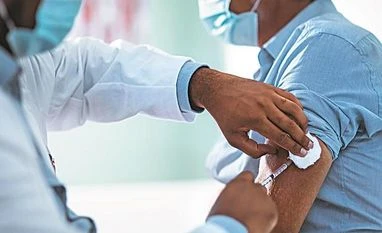Supply challenges for auto-disable (AD) syringes in the private market may derail the vaccination drive for private hospital networks. After the Centre allowed private hospitals to actively take part in the vaccination for senior citizens and those above 45 years with comorbidities, the demand for AD syringes has gone up. This round of the national immunisation drive has already seen a better turnout and private hospitals are finding it difficult to source AD syringes.
AD 0.5-ml syringes are designed in a way that they cannot pull in more than 0.5 ml. Vaccinators have been trained with AD syringes, which is why private hospitals are insisting on this.
“Since this is a vaccine, the dosage should be perfect. The syringe used for inoculation is a specially-designed one, which has a locking mechanism to prevent extraction of more than 0.5 ml of the vaccine. This syringe is provided by a handful of manufacturers supplying only to the government. There is a shortage of AD syringes,” said Rupak Barua, group chief executive officer and director, AMRI Hospitals.
So far, the syringes were being supplied by the state government. These would have to be replaced later by the private hospital.
“On Tuesday, we were informed that the government would not be able to supply further and we would have to procure from the market. We are trying to procure from the market, but the availability is patchy. If it doesn’t improve, then vaccinations will drop. We now have stock for one to two days and are trying to procure whatever we get from the market,” said Barua.
For front-line and health workers, the syringes were supplied by the government.
Typically, AD syringes are used by the Government of India (GoI) for the national immunisation programme and the private vaccine market usually uses disposable syringes. Industry sources revealed the health ministry is of the opinion that private hospitals can continue to use disposable syringes for Covid. In some states where the state governments can supply AD syringes to hospitals when they buy the vaccine, it will be done.
In Mumbai, for example, hospitals await clarity on whether they can buy the syringes from the civic authorities. Joy Chakraborty, chief operating officer of city-based Hinduja Hospital said it has started making enquiries about AD syringes about a week back and has secured some samples. In case these specific syringes are not available, it would await instructions from the epidemiology cell of the civic body.
Some hospital networks like Manipal Group have decided to use tuberculin syringes (which also help to draw an exact amount of dose) for the Covid-19 vaccination drive. They are bearing the cost themselves.
Why is there a crisis?
The GoI has placed huge orders for AD syringes with manufacturers like Hindustan Syringes & Medical Devices (HMD) who make the Dispovan brand of syringes, and others.
It had placed orders for 230 million syringes earlier, which are to be delivered by April. Now it has placed another order for 350 million syringes, which has to be delivered by September.
Moreover, there is demand from global non-profit organisations like the United Nations International Children's Emergency Fund (UNICEF) for both Covid and routine immunisation.
According to a document that the manufacturers have shared with the government, India roughly has an annual capacity to make 1.08-billion 0.5-ml AD syringes per annum between key players HMD (720 million), Iscon Surgicals (180 million), and Becton, Dickinson and Company (180 million). The three manufacturers are planning to increase this to 1.42 billion (HMD up to 1 billion; Iscon will ramp up to 240 million) by mid-2021.
Rajiv Nath, chairman and managing director of HMD, said it has already ramped up capacities to 800 million pieces per annum and will take it up to 1.2 billion syringes per annum by the April-June quarter of 2021-22.
His firm is all set to supply 177 million syringes to the government by April and will supply another 265 million by September.
“We also have orders from UNICEF — around 425 million AD syringes. Of this, around 160 million are for routine immunisation, the rest are for Covid-19,” said Nath. HMD has already supplied 140 million syringes to UNICEF.
The syringe maker had planned to divide production 50:50 between India and its global commitments. Now, says Nath, he will supply two-thirds to India till September at least.
SUPPLY-DEMAND SNAPSHOT
Annual demand for AD syringes: >200-300 million for national immunisation
In 2021, additional 500-million demand estimated
Annual demand for disposable syringes: >4 billion syringes and 5 billion needles
In 2021, additional 500-million demand estimated
GoI placed orders for 580-million AD syringes
Industry estimates GoI is carrying buffer stock of few hundred million syringes
Unlock 30+ premium stories daily hand-picked by our editors, across devices on browser and app.
Pick your 5 favourite companies, get a daily email with all news updates on them.
Full access to our intuitive epaper - clip, save, share articles from any device; newspaper archives from 2006.
Preferential invites to Business Standard events.
Curated newsletters on markets, personal finance, policy & politics, start-ups, technology, and more.
)